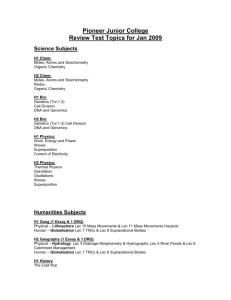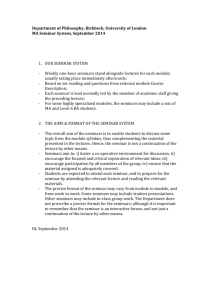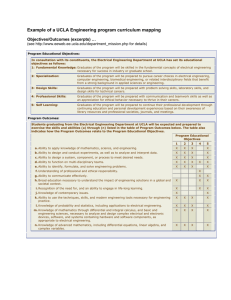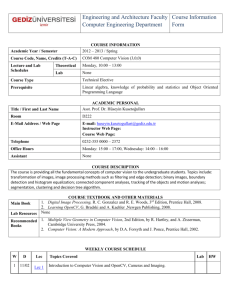Justification for Professor Milem`s proposal
advertisement
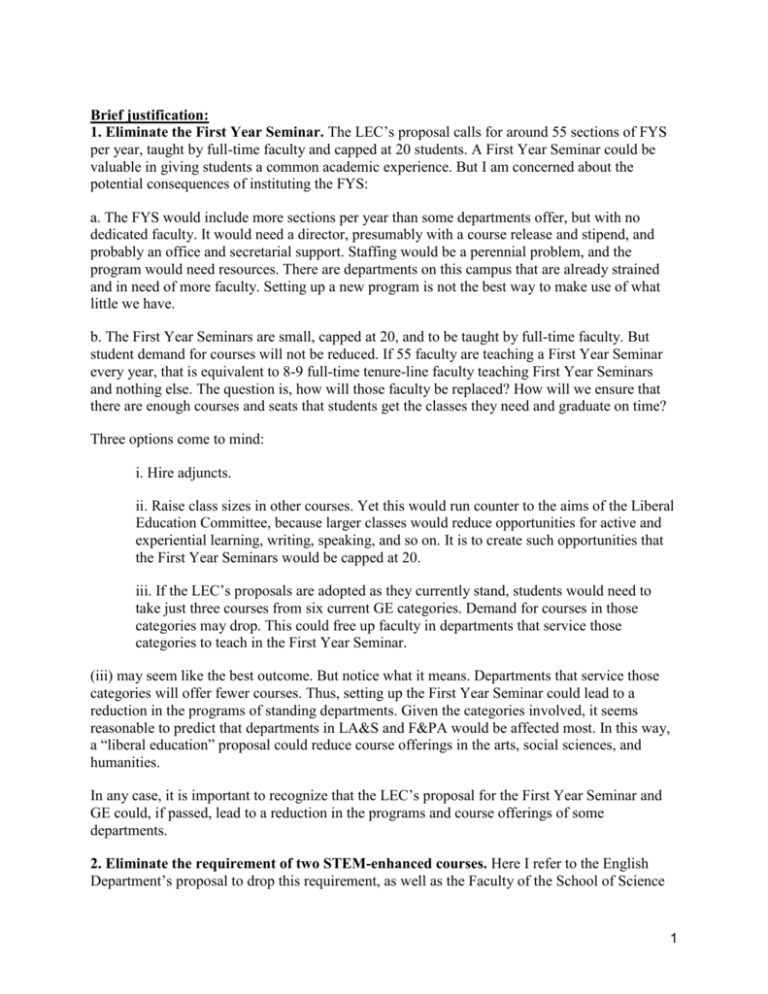
Brief justification: 1. Eliminate the First Year Seminar. The LEC’s proposal calls for around 55 sections of FYS per year, taught by full-time faculty and capped at 20 students. A First Year Seminar could be valuable in giving students a common academic experience. But I am concerned about the potential consequences of instituting the FYS: a. The FYS would include more sections per year than some departments offer, but with no dedicated faculty. It would need a director, presumably with a course release and stipend, and probably an office and secretarial support. Staffing would be a perennial problem, and the program would need resources. There are departments on this campus that are already strained and in need of more faculty. Setting up a new program is not the best way to make use of what little we have. b. The First Year Seminars are small, capped at 20, and to be taught by full-time faculty. But student demand for courses will not be reduced. If 55 faculty are teaching a First Year Seminar every year, that is equivalent to 8-9 full-time tenure-line faculty teaching First Year Seminars and nothing else. The question is, how will those faculty be replaced? How will we ensure that there are enough courses and seats that students get the classes they need and graduate on time? Three options come to mind: i. Hire adjuncts. ii. Raise class sizes in other courses. Yet this would run counter to the aims of the Liberal Education Committee, because larger classes would reduce opportunities for active and experiential learning, writing, speaking, and so on. It is to create such opportunities that the First Year Seminars would be capped at 20. iii. If the LEC’s proposals are adopted as they currently stand, students would need to take just three courses from six current GE categories. Demand for courses in those categories may drop. This could free up faculty in departments that service those categories to teach in the First Year Seminar. (iii) may seem like the best outcome. But notice what it means. Departments that service those categories will offer fewer courses. Thus, setting up the First Year Seminar could lead to a reduction in the programs of standing departments. Given the categories involved, it seems reasonable to predict that departments in LA&S and F&PA would be affected most. In this way, a “liberal education” proposal could reduce course offerings in the arts, social sciences, and humanities. In any case, it is important to recognize that the LEC’s proposal for the First Year Seminar and GE could, if passed, lead to a reduction in the programs and course offerings of some departments. 2. Eliminate the requirement of two STEM-enhanced courses. Here I refer to the English Department’s proposal to drop this requirement, as well as the Faculty of the School of Science 1 and Engineering’s statement about changing the NSCI requirement. It would be much better to retain our current requirement of two courses in NSCI. 3. Eliminate the requirement of two communications-enhanced courses. These courses would be capped at 20 students also. Essentially the LEC’s proposal doubles the current WritingIntensive requirement. Thus, we would again be adding a significant number of courses that are capped at 20. This aspect of the proposal raises the same problem of serving student demand that the First Year Seminars do, but here the only solutions are to hire adjuncts or raise class sizes. I share the LEC’s goals of giving students more opportunities to write and speak. My suggestion is that programs be encouraged or required to add proficiency in writing and speaking to their program learning outcomes (if they’re not already there) and work out how best to reach those goals. 4. Restore the requirement of courses in ARTS, HUM, WEST, USST, SSCI, WRLD, and DIVR. Under the LEC’s proposal, it would be possible for students to graduate from New Paltz without ever taking a course in humanities, or a course in social sciences, or a course in art. They would have to take courses in some of these categories. But they could graduate without taking courses in one, two, or three of them. The proposal sacrifices breadth of learning and signals the lesser importance of these categories. (See also the Art Department’s proposal to require courses in the ARTS category.) 5. Restore the requirement of two courses in NSCI. Here I refer to the “Amendment proposed by the Faculty of the School of Science and Engineering” and the statement in support of it, which argues cogently for the importance of science education at the college level. 6. Keep Critical Thinking/Systematic Inquiry as a competency that GE courses may have. In the LEC’s proposal, the Board of Trustees’ required competency of Critical Thinking would be served in the First Year Seminar. If the FYS is eliminated, we will still need to address CT. Which we are now, in many courses in our current GE3. So we should retain this model by permitting appropriate courses in any category to apply for this competency. 2

